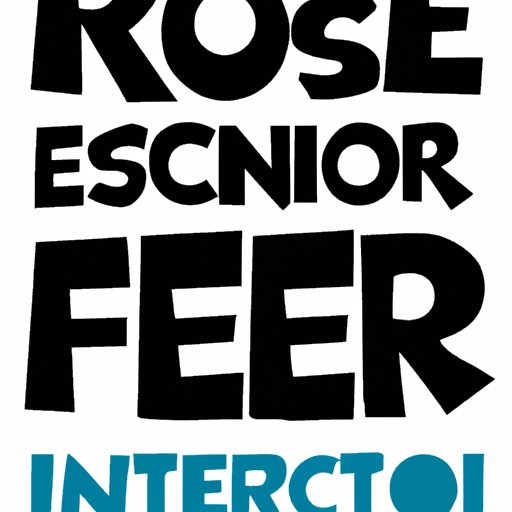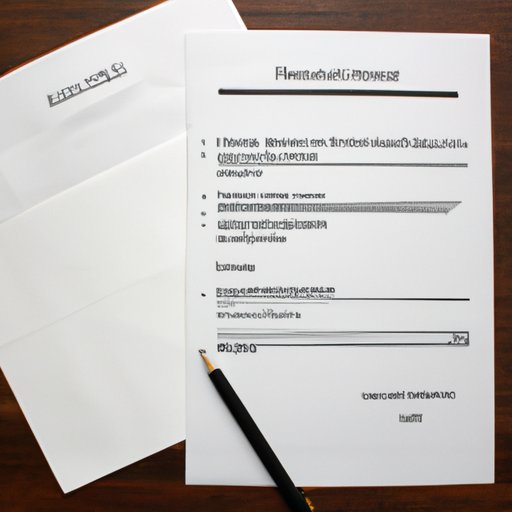Introduction
Forensic science is a field that combines science and technology to help solve crimes. From analyzing DNA and fingerprints to reconstructing crime scenes, forensic scientists use their expertise to support investigations and bring justice to victims. If you’re interested in a career in forensic science, there are several steps you can take to increase your chances of landing a job.

Research Forensic Science Job Opportunities
The first step in the job search process is to research available positions. There are a variety of ways to do this, including using online resources, attending career fairs, and networking with professionals in the field.
Use Online Resources
The internet is an invaluable resource for job seekers. Sites such as Indeed and Glassdoor offer a wide range of listings for forensic science jobs. You can narrow down your search based on location, salary, and other criteria. Additionally, many companies post open positions on their own websites or social media accounts.
Attend Career Fairs
Career fairs are another great way to explore potential job opportunities. Many recruiters attend these events to find qualified candidates, so it’s important to make a good impression. Bring copies of your resume and be prepared to answer questions about your qualifications and experience.
Network with Professionals in the Field
Networking is one of the most effective job search strategies. Connect with professionals in the forensic science field to learn more about job opportunities and gain insight into the industry. Attend conferences and seminars, join industry associations, and use social media platforms to expand your network. According to a survey by LinkedIn, 85% of jobs are filled through networking.1
Develop a Working Knowledge of Forensics
Before applying for jobs, it’s important to have a firm understanding of forensic science principles and techniques. This knowledge will help you stand out from other applicants and demonstrate your commitment to the field.
Understand the Principles of Forensics
Forensic science involves the application of scientific methodology to criminal investigations. To get a job in the field, you should understand the basics of evidence collection, analysis, and preservation. Additionally, familiarize yourself with the legal aspects of forensics, such as chain of custody procedures and courtroom testimony.
Become Familiar With the Tools and Technology Used
Forensic science relies heavily on technology and specialized tools. Become familiar with the instruments used in the field, such as microscopes, spectrometers, and chromatographs. Additionally, stay up-to-date on the latest developments in forensic science, such as advanced DNA sequencing techniques.

Build a Resume and Cover Letter Tailored to the Position
Once you have a solid understanding of the field, you’ll need to create a resume and cover letter tailored to the position. Your resume should clearly highlight your skills and experience in forensic science, while also showcasing any other relevant qualifications. Additionally, use keywords throughout your resume and cover letter to show employers that you’re the ideal candidate for the job.
Highlight Relevant Skills and Experience
Your resume should include any relevant experience and certifications. List any courses or trainings you’ve completed, such as those in evidence collection or laboratory analysis. Additionally, showcase any research projects or internships you’ve participated in.
Use Keywords to Showcase Your Qualifications
Employers use applicant tracking systems (ATS) to scan resumes for specific keywords. Incorporate words and phrases related to forensic science, such as “crime scene investigation” or “DNA analysis”, to ensure your resume is properly indexed. Additionally, use industry-specific jargon to demonstrate your knowledge of the field.
Take Advantage of Professional Networking Opportunities
Professional networking is essential for finding a job in any field. Take advantage of opportunities to connect with industry professionals and gain valuable insights into the industry. Here are a few tips for leveraging professional networking to land a job in forensic science.
Join Industry Associations
Joining professional organizations is a great way to build relationships with other forensic scientists. These organizations often host events and workshops where you can meet potential employers, exchange ideas, and learn the latest advancements in the field.
Attend Conferences and Events
Attending conferences and other industry events can provide valuable networking opportunities. Use these events to meet potential employers and build connections within the field. Additionally, many of these events feature presentations and workshops that can help you stay up-to-date on the latest developments in forensic science.

Participate in Relevant Internship Programs
Internships are a great way to gain practical experience in the field. Many forensic science programs offer internship opportunities, so look for ones that align with your interests and goals. Participating in an internship will give you a chance to hone your skills and develop relationships with professionals in the field.
Gain Practical Experience
Internships provide valuable hands-on experience and allow you to apply what you’ve learned in the classroom. Additionally, many internships offer mentorship opportunities, allowing you to learn from experienced professionals in the field.
Build Connections
Internships are also a great way to build connections. Working closely with experienced professionals gives you the chance to ask questions and gain valuable insights into the industry. Additionally, many internships lead to full-time job offers.
Pursue Relevant Education and Training
Having the right educational background and training is key to getting a job in forensic science. Consider pursuing a degree in forensic science or a related field, such as biology or chemistry. Additionally, there are a variety of professional certifications available for forensic science professionals, such as the Certified Forensic Scientist (CFS) credential.
Consider Graduate Degrees
Many forensic science jobs require a graduate degree. Consider pursuing a master’s or doctoral degree in the field to increase your chances of landing a job. Additionally, many universities offer specialized certificates in forensic science.
Explore Professional Certifications
Professional certifications can demonstrate your dedication to the field and set you apart from other applicants. The American Board of Criminalistics and the International Association for Identification both offer certifications for forensic science professionals. Additionally, many states offer licensing requirements for those working in the field.
Stay Up-to-Date on Industry Trends and News
To get a job in forensic science, you must stay up-to-date on the latest industry trends and news. Read relevant publications and follow industry leaders on social media to stay informed. Additionally, consider subscribing to newsletters or blogs to stay abreast of the latest developments in the field.
Read Relevant Publications
Reading industry publications is a great way to keep up with the latest advancements in forensic science. Popular publications include the Journal of Forensic Sciences, the American Journal of Forensic Medicine and Pathology, and the International Journal of Legal Medicine. Additionally, many trade magazines offer articles about the field.
Follow Industry Leaders
Social media is an invaluable tool for staying up-to-date on industry news. Follow experts in the field and join relevant groups to stay informed. Additionally, many forensic science professionals share helpful advice and resources on their social media accounts.
Conclusion
Finding a job in forensic science requires research, preparation, and persistence. To increase your chances of success, research job opportunities, develop a working knowledge of forensics, build a tailored resume and cover letter, take advantage of professional networking opportunities, participate in relevant internship programs, pursue relevant education and training, and stay up-to-date on industry trends and news.
Summary of Steps for Finding a Job in Forensic Science
- Research job opportunities
- Develop a working knowledge of forensics
- Build a tailored resume and cover letter
- Take advantage of professional networking opportunities
- Participate in relevant internship programs
- Pursue relevant education and training
- Stay up-to-date on industry trends and news
Final Remarks
Finding a job in forensic science requires dedication and hard work. However, with the right preparation and research, you can increase your chances of success. By following the steps outlined above, you can position yourself for a rewarding career in the field.
(Note: Is this article not meeting your expectations? Do you have knowledge or insights to share? Unlock new opportunities and expand your reach by joining our authors team. Click Registration to join us and share your expertise with our readers.)
